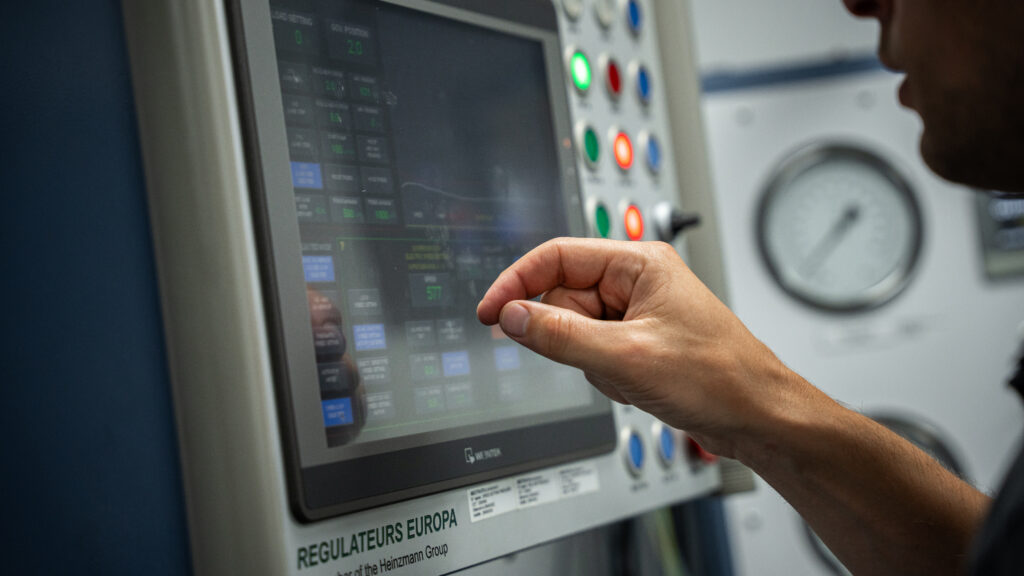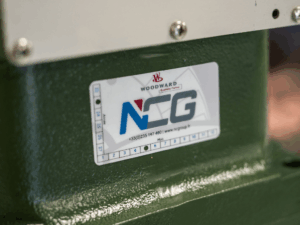A central element in speed control
The role of the Woodward governor in a turbine begins with a fundamental function: maintaining a constant speed despite load variations. A turbine – whether hydraulic, steam or gas – operates optimally at a specific frequency. The slightest drift in speed can lead to mechanical imbalances, reduced efficiency and even emergency shutdowns.
The Woodward controller acts like an electronic or mechanical brain, continuously monitoring the speed of rotation. When a variation is detected, it automatically adjusts the position of the actuator (valves, fuel injection, etc.) to stabilize the system. This is done in a matter of milliseconds, without human intervention, ensuring fine, constant and reliable regulation.
In an industrial environment where precision is paramount, the role of the Woodward regulator in a turbine is therefore decisive in guaranteeing production continuity and avoiding jolts that could harm the entire energy chain.
Maintaining plant safety
The safety of energy installations is a top priority, and the Woodward controller plays a key role in this. In addition to regulating speed, it detects and anticipates critical situations such as overloads, load losses, excessive vibrations or abnormal operating conditions.
In the event of an anomaly, the controller is programmed to trigger an automatic response. It can, for example, force a valve to close, deactivate a control system or send an alert to the supervision unit. The role of the Woodward controller in a turbine is therefore also to protect operators, equipment and the environment against any technical or mechanical incident.
It is this ability to react quickly and accurately that makes Woodward equipment a strategic choice for power plants, marine applications and highly critical industrial sites.

Intelligent load-dependent control
Unlike a passive system, a Woodward regulator adjusts its response to turbine loads. If the load on the grid increases – for example, a higher demand for electricity – the governor increases fuel flow or hydraulic opening to maintain power output without imbalance.
This intelligent control system optimizes machine performance in real time. Energy efficiency is improved, resource consumption is adjusted, and mechanical wear is reduced. This adaptive operation demonstrates that the Woodward governor’s role in a turbine goes far beyond simple regulation: it plays an active part in the plant’s economic performance.
In contexts of intermittent or variable energy production, such as hydropower or isolated sites, this type of adaptive management is absolutely essential.
A key interface for plant automation
Modern Woodward controllers, such as the 723 Digital or 505XT, are much more than mechanical controllers. They incorporate digital technologies for remote supervision, communication with PLCs, and continuous analysis of operating data.
Thanks to their Ethernet, Modbus or CANopen interfaces, they integrate perfectly into SCADA supervision architectures or predictive maintenance systems. The role of the Woodward controller in a turbine is thus extended to that of a major player in plant digitalization.
It enables operators to monitor performance in real time, anticipate deviations in behavior, and optimize maintenance. This on-board intelligence becomes a strategic asset for improving availability and reducing unplanned downtime.

A role that varies according to turbine type
Although the control principle remains the same, the role of the Woodward governor in a turbine may vary according to the nature of the machine. On a hydraulic turbine, the governor generally controls the opening of the valves or the water injectors. In a gas turbine, it controls combustion and fuel pressure. For a steam turbine, it adjusts steam flow to the expansion chamber.
This adaptability makes Woodward controllers versatile and compatible with a wide range of configurations. Depending on the specific requirements of the application (fixed speed, variable frequency, emergency modes, etc.), the regulator can be programmed with very fine parameters.
It’s this flexibility that makes Woodward a global reference in the energy, shipping and distributed generation sectors.
Why call on Normandy Control Group/NCG?
When you choose Normandy Control Group, you choose a partner you can trust for the maintenance and repair of your industrial equipment. As an official Woodward and Parker Meggitt (vibro-meter) distributor in France and French-speaking Africa, including Algeria, Tunisia and Morocco, we offer recognized expertise in the field. We also have two workshops in France, in Le Havre and Marseille, as well as Woodward workshops in Côte d’Ivoire and Senegal.



